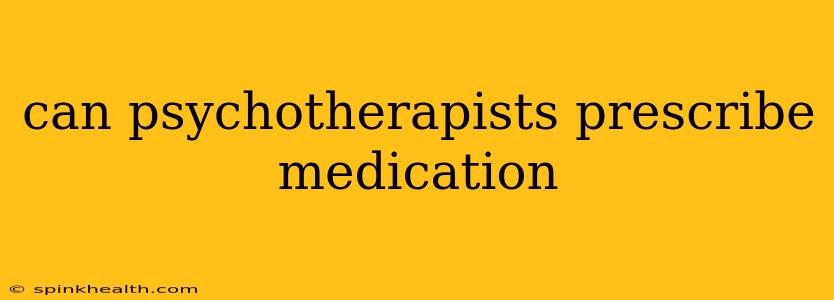Can Psychotherapists Prescribe Medication? The Complex Answer
The question of whether psychotherapists can prescribe medication is a nuanced one, varying significantly depending on location and specific training. It's not a simple yes or no answer, and the truth lies within a complex landscape of regulations and professional roles.
My journey into understanding this started with a conversation with a friend struggling with anxiety. She’d been seeing a therapist for several months, finding their talk therapy helpful but still experiencing significant symptoms. She asked her therapist about medication, and the therapist referred her to a psychiatrist. This sparked my curiosity. Why the referral? Could all therapists prescribe?
The short answer is: generally, no, psychotherapists cannot prescribe medication.
However, let's unpack this further. The key is understanding the difference between a psychiatrist and a psychotherapist. This distinction is crucial in determining medication prescription rights.
What is the difference between a psychiatrist and a psychotherapist?
Psychiatrists are medical doctors (MDs or DOs) specializing in mental health. Their extensive medical training allows them to diagnose mental illnesses, prescribe medication, and monitor patients' responses to treatment. Think of them as the medical doctors of the mental health world.
Psychotherapists, on the other hand, are mental health professionals who provide talk therapy. This could include psychologists, social workers, counselors, or marriage and family therapists. Their focus is on using various therapeutic techniques to help patients understand and manage their mental health challenges through conversation and therapeutic exercises. They do not have the medical training to prescribe medication.
Can some therapists prescribe medication? What about Nurse Practitioners?
The exception to this rule lies in some areas where certain advanced practice registered nurses (APRNs), including psychiatric nurse practitioners (PMHNPs), are authorized to prescribe medication under specific state regulations. This is becoming increasingly common, but the regulations vary widely by state and even sometimes by county. Their prescriptive authority is based on their advanced medical training.
Why the division of labor?
The separation of medication prescription from talk therapy is often considered beneficial. It ensures patients receive both the appropriate medical care and the therapeutic support needed to address their mental health. A psychiatrist’s medical expertise helps determine the correct diagnosis and choose the best medication approach, while a psychotherapist helps patients work through the underlying emotional and behavioral issues contributing to their mental health condition.
What should I do if I need both therapy and medication?
If you're struggling with mental health challenges and believe medication might be helpful, it's best to consult with a psychiatrist or PMHNP. They can assess your needs, make a diagnosis, and prescribe appropriate medication. Simultaneously, working with a psychotherapist can provide you with valuable tools and strategies to manage your condition effectively in conjunction with medication. A collaborative relationship between these professionals can be especially helpful.
Can a therapist recommend medication?
While a psychotherapist cannot prescribe medication, they can certainly recommend that you consult a psychiatrist or other medical professional if they believe medication would be beneficial. They may also work with you to explore other options alongside medication, such as lifestyle changes or alternative therapies.
In conclusion, the ability to prescribe medication comes down to medical training and licensing, not just the title "therapist." Finding the right mental health professional for your specific needs requires careful consideration and may involve working with multiple practitioners in a coordinated care plan.

